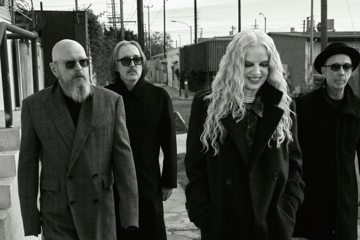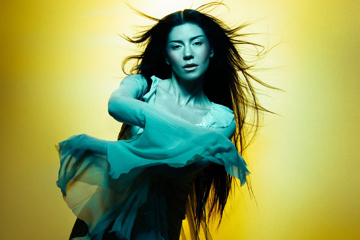How Taylor Mac Restored My Faith
For four life-changing nights during this year's Melbourne Festival, Taylor Mac took me to church. And it could not have come at a more important moment.
I'll admit that I've never really understood religion, largely because, as a queer man, religion has never really understood me. But the past few months have given me and many others in my community particular cause to fear the faithful. We're not unused to this danger: in their near-hysterical pageants of devotion, Evangelical ministries have long declared our very existence proof of evil. But as the church and other Christian lobbies in Australia have proudly invested millions to remind LGBTQIA+ people that we are lesser beings, this hatred has been harder to ignore. Christian disgust has been blazed across the very sky as our equal rights have been declared the gateway to the unravelling of society.
This deafening moral outrage is identically opposite to the evasive silence in which so many in the queer community must exist; queer lives are ones accustomed to being in the shadow of suspicion. Consequently, our bodies have become expert at concealing their true desires, our minds have been conditioned to feel reflexive guilt. Over and over, in myriad, everyday ways, we are reminded that queer joys are clandestine, queer truths are transgressions. And now, more so than ever, Christian fear-mongering seeks to inflame these entrenched stigmas. Is it any wonder that I, and many LGBTQIA+ people, resent and reject the idea of organised spirituality?
And yet, in the church of Taylor Mac - drag icon, chanteuse, performance art radical, playwright, philosopher, prophet: a once in a generation polymath - I discovered a belief system that not only accepted me, but empowered, celebrated, and rejoiced in every shade of my rainbow family. And apologised to no one.
This spiritual awakening took the guise of Mac's audacious magnum opus, the humbly titled A 24 Decade History Of Popular Music. Performed across four six-hour "chapters" - although it has been performed once before, in New York, as an all day-all night marathon extravaganza - Mac offers a chronicle of American culture through a queering prism. Using a scaffold of song, this epic show sweeps aside the absolving misrememberings of established histories to confront and challenge a status quo built on colonial greed and heteronormative oppression.
Don't miss a beat with our FREE daily newsletter
It would be easy to describe this show with nothing but breathless hyperbole. I can't promise this report won't meet that fate, but I don't think it would be inaccurate to say this extraordinary work is something akin to a religious experience, or as close to one as I've ever accessed. By Mac's own admission, it is "a radical faerie realness ritual sacrifice. The performance is the ritual, and you [the audience] are the sacrifice." And thus, alongside hundreds of like-minded Melburnians, I offered up my heart and head on the altar of Mac, as a straight, scarred, segregated past was used to light the way to an inclusive, diverse, woke future.
Beginning in 1776, and the founding of America, each hour unriddles a decade of US history using an artfully selected, thoroughly researched collection of songs from the corresponding period. Through the American Civil War, the Trail of Tears, Women's Suffrage, the Great Depression, The Civil Rights Movement, the war in Vietnam and Gay Liberation, we witness how discrimination and persecution are constants through time. Mac is at the centre of this odyssey, although judy (Mac's favoured pronoun) is not alone. A 24-strong band, a chorus line of "Dandy Minions" sourced from Melbourne's rich community of queer artists, a troupe of Burlesque dancers, a temperance choir, an ensemble of acrobats, two giant inflatable cocks, one giant vulva, hundreds of ping pong balls and several gallons of soup, all form part of Mac's kaleidoscopic arsenal, as a carnival of eye-popping creativity is unleashed upon us. The audience are also included in this armoury. As we follow instructions, to dance, to sing, to connect with each other in intimate, deeply personal ways, our subjective experiences become Mac's most powerful resource; we enter the theatre as strangers but leave a community, galvanised and unbowed.
While essentially a history lesson, nothing is remotely predictable about this show. From a WWE wrestling smackdown between Walt Whitman and minstrel songwriter Stephen Foster, to a trip to Mars via Gilbert and Sullivan, at every turn, Mac conjures ever more surprising ways to introduce us to the past, all the while subverting the discrimination woven into the fabric of our culture. And while, in the broadest sense, it is a kind jukebox musical, everything about this production is bespoke. Take, for example, the 24 extraordinary costumes - one for every hour of the show - created by visionary designer Machine Dazzle, or the astonishing musical alchemy of MD Matt Wray's 246 arrangements. Our expectations are surpassed, and surpassed again, in the best way possible. In perhaps the most magical transfiguration, Mac and co take Trump-o-phile Ted Nugent's homo-hating anthem, Snakeskin Cowboys, and turn it into a slow dance for the queer prom we all wish we'd been allowed to have.
There are tears to shed - a lot of them - during this day-long rite. Mostly, it's empathy that moves us, but in many instances - and I don't think it would be presumptuous to say I wasn't alone in feeling this - I shed these tears for myself; my own experiences of discrimination finding solidarity in 240-years of segregation, reminding me that I am not alone. But overwhelmingly, A 24 Decade History of Popular Music is a wild, filthy, irrepressible ode to freedom. In the final hour of the show, when all the ping pong balls have been thrown, when all the costumes have been worn, when all the minions have frolicked through The Forum, Mac is left on stage alone. From the audience, a vast spectrum of emotions, summoned and explored during the previous 23 decades, become focused on a single point on stage. As our journey through time reaches the present, and the show draws to a reluctant close, there is nothing left to do but cheer, as long and as loud as we can. And there are more tears too - this time of gratitude; at a time when our queer humanity has been so attacked, Taylor Mac has restored our faith.







